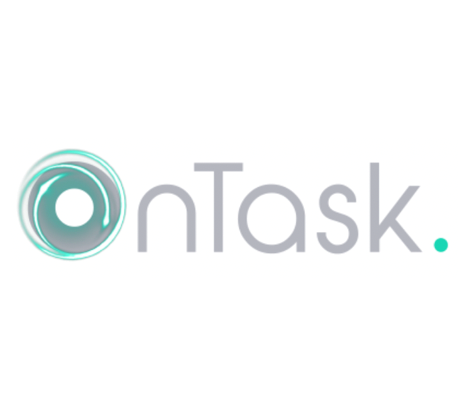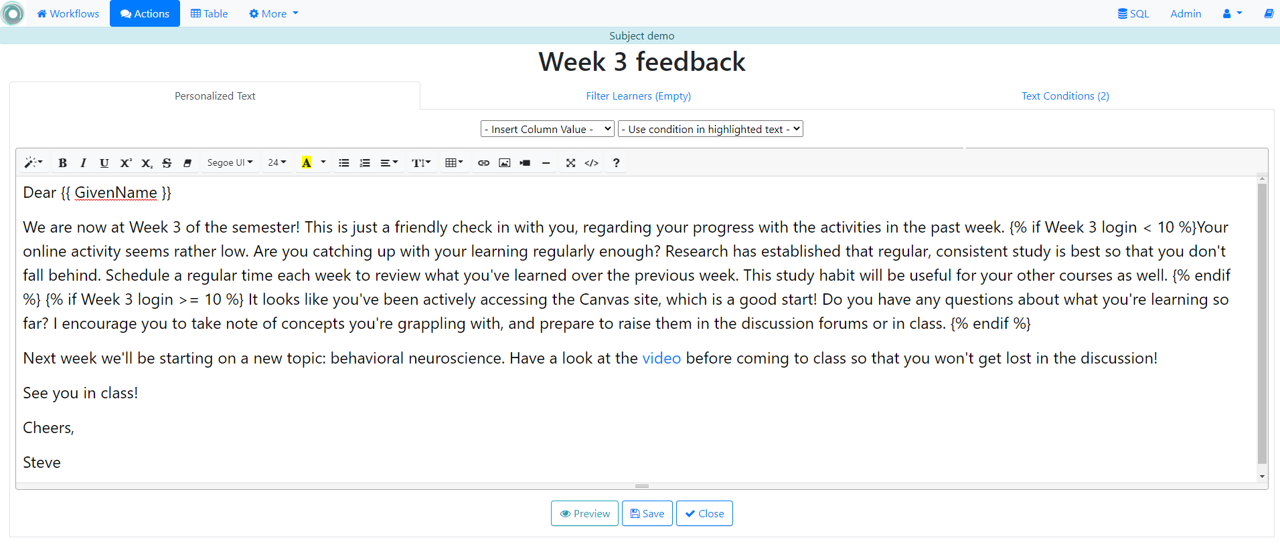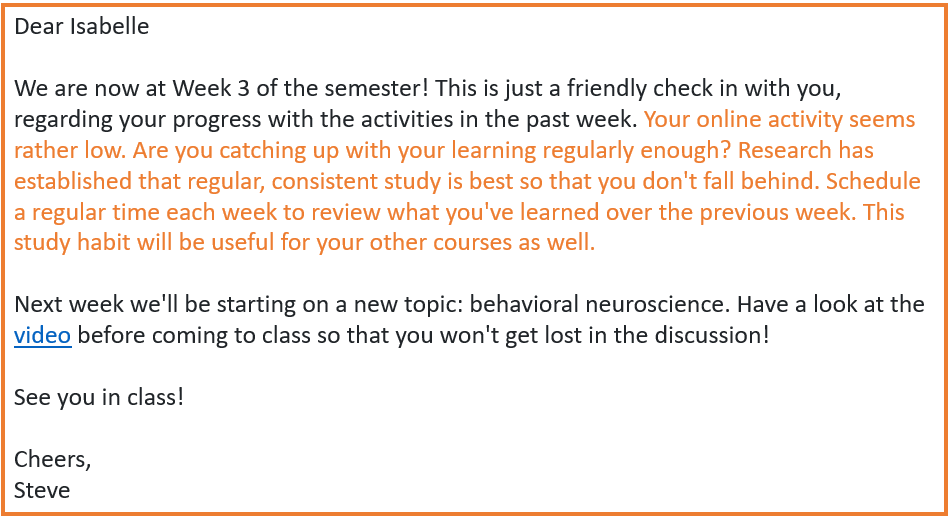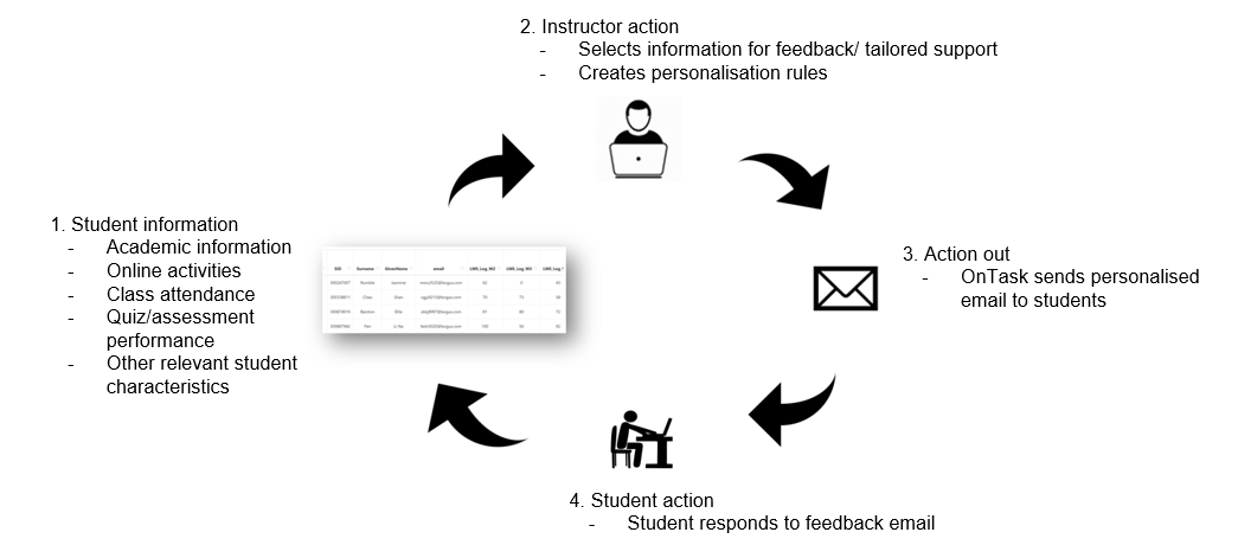The Challenge
What’s the challenge?

Studying at university requires students to be able to maintain a high degree of control over their learning, by setting goals for study, managing their time to keep up with learning tasks and assessments, and using strategies to prepare for examinations. All the while they need to maintain a sufficient level of motivation to consistently engage with their studies. Students need feedback on their progress, so that they know how to adjust their learning strategies and study habits.
Effective feedback is timely, understandable, supportive, actionable, and personalised to individual learners’ needs. But university enrolments today are characterised by burgeoning class sizes and diverse cohorts, a significant proportion of whom are based overseas. Being able to provide regular and tailored support therefore poses a considerable challenge. Added to this is the increasing shift to online and blended modes of learning, which creates another challenge: to know how students are engaging in or coping with their studies and therefore being able to reach out to them with personalised support.
It is here that automated feedback tools have a potential contribution to make, as a way to augment the feedback that the teaching team already provides, and expand their capacity to support many students.

How does OnTask work?
How does OnTask work?
OnTask was developed by a consortium of Australian universities, funded by the national Office of Learning & Teaching. It is a web-based application that enables academics to collate data about their students’ ongoing progress and relevant learner information in their subjects, personalise messages for feedback and support based on this information, and send these as individual emails to all students in their subject, all on the one platform.
The personalised messaging system works by facilitating academics to create these personalised messages based on “if-this-then-that” rules. And because academics are the ones writing the message, students get a sense of that personal connection and belonging which might be hard to achieve when they feel that they are just one out of a thousand-strong cohort.


OnTask is an open system, meaning that as an academic, you can pull into its repository any information that might be relevant for personalising your feedback and communication to your students. For example, you might want to find out what topics your students are finding particularly challenging, or how they are feeling about their study at the moment. You can do this by sending your students a survey on Google or Microsoft Forms, and adding your students’ responses as additional data, into the information table in OnTask. You may then craft personalised messages based on their response.
OnTask facilitates the collation of data about students’ ongoing progress in a teaching context and the communication of personalised feedback and support in a continuous feedback loop. This means that, as students progress through a subject, academics can keep building up the information table by pulling in Canvas activity data, attendance data, survey data and interim performance data, for personalising regular feedback and support over the study period. The regularity of feedback communication not only allows students to act on recommended actions in order to improve their learning processes and outcomes, but may also foster a stronger sense of belonging through connections with their subject coordinators.

OnTask and similar systems called SRES and ECoach are used at other universities in Australia and New Zealand, the US, and in Europe. A growing body of evidence is demonstrating the impact this can make when it is used effectively to deliver personalised feedback and support to students (see Underpinning Research tab).
How is OnTask used @UTS?
How is OnTask used @UTS?
There is a small but growing number of academics at UTS who have been using OnTask to personalise feedback and support in their subjects. We interviewed a few of them to find out about their experience; watch the videos below to hear what they say about using OnTask in their teaching. The first is a 5-minute teaser; the second is a 20-minute coffee break video if you have more time.
Below are the stories of two academics from different faculties.
In Business…
OnTask has been piloted with the UTS Business School. Senior Lecturer James Wakefield and his teaching team have been using OnTask with a large first year accounting subject for a few years now. The subject comprises face-to-face lessons, with weekly quizzes in the subject Canvas. James’ main intention for using OnTask was to communicate to students about their engagement with the weekly quizzes in this subject, as these are important for students to gain mastery in the topics. He and his teaching team personalise feedback messages according to whether students have completed the quiz, as well as their performance on the quiz. Included in these feedback messages are recommended follow-up actions by students as well as notes of encouragement.

From James’ observations, the personalised messaging appeared to increase students’ motivation to learn in the subject, and also helped students to experience a greater sense of belonging. Here’s James sharing his experience at a recent workshop on automated feedback here at UTS.
In Engineering…
Timothy Boye and Eva Cheng use OnTask in a large first year Engineering Communication subject. This subject uses a flipped learning design, where students are required to complete pre-work before attending tutorials. The main intention for using OnTask was to check in with students who are missing out on completing their learning tasks in the subject, such as quizzes, assessments, and pre-work. The teaching team tracked students’ completion of learning tasks through Microsoft Forms, which students filled in as they worked through the task. While the feedback messages were personalised according to whether students have completed the task, the teaching team also incorporated an element of friendly competition among classes, to encourage all students to complete the task.
From their observations, the feedback messages were received well by students. Similar to the Accounting subject described above, students also experienced a greater sense of belonging, and helped them to remember to complete the necessary tasks. For the teaching team, the emails they received from students in response to their feedback helped them to recognise the issues that they faced in their studies, which they were then able to consider how to enhance support.


Listen to Eva as she describes this instance of OnTask here
For other news stories about OnTask, point your browser here.
What about you? What will your story about OnTask look like? If you are thinking about getting started with OnTask, head over to the next tab: How do I get started teaching with OnTask?
How do I get started?
How do I get started?
Access to OnTask
OnTask is an open-source, web-based application. It is already available to all UTS staff on an individual account basis. If you would like to explore using OnTask, please email cic@uts.edu.au to obtain an account, with “OnTask enquiry” in the Subject line.
Training
CIC runs 2-part Zoom workshops on OnTask. So if you’re keen to know more and to get your hands dirty with this feedback tool, come along for the sessions!
UTS educators: If you would like to know more about any aspect of OnTask and its use in teaching, we invite you to reach out to us.
UTS professional staff and researchers: If you would like to explore customised messaging in other contexts, we welcome your queries too!
Feel free to email us at Ed.Connect@uts.edu.au with “OnTask” in the subject line.
Underpinning research
Underpinning research
OnTask is the outcome of an R&D project, funded by the Office of Learning and Teaching. As such, it is backed by a growing body of research evidence. Research examining the impact of this learning analytics-based feedback tool has started to document the benefits of using OnTask for personalised feedback and support for students.
In summary, studies evaluating the impact of OnTask implementation in teaching contexts have found the following benefits:
- Enhanced the course experience4,6
- Elicited a ‘safe anxiety’2
- Spurred motivation2,3
- Fostered greater feelings of support2,4
- Fostered more optimal study habits1,5
- Enhanced academic performance1,6
- Supported all phases of self-regulated learning3
- Lim, L.-A., Gentili, S., Pardo, A., Kovanović, V., Whitelock-Wainwright, A., Gašević, D., & Dawson, S. (2021). What changes, and for whom? A study of the impact of learning analytics-based process feedback in a large course. Learning and Instruction, 72, 101202. https://doi.org/10.1016/j.learninstruc.2019.04.003
- Lim, L.-A., Dawson, S., Gašević, D., Joksimović, S., Pardo, A., Fudge, A., & Gentili, S. (2020). Students’ perceptions of, and emotional responses to, personalised LA-based feedback: An exploratory study of four courses. Assessment & Evaluation in Higher Education. https://doi.org/10.1080/02602938.2020.1782831
- Lim, L.-A., Dawson, D., Gašević, D., Joksimović, S., Fudge, A., Pardo, A., & Gentili, S. (2020). Students’ sense-making of personalised feedback based on learning analytics. Australasian Journal of Educational Technology, 36(3), 15-33. https://doi.org/10.14742/ajet.6370
- Lim, L.-A., Fudge, A. & Dawson, S. (2019). Feeling supported: Enabling students in diverse cohorts through personalised, data-informed feedback. In Y. W. Chew, K. M. Chan, and A. Alphonso (Eds.), Personalised Learning. Diverse Goals. One Heart. ASCILITE 2019 Singapore (pp. 206-215). https://2019conference.ascilite.org/assets/papers/Paper-111.pdf
- Matcha, W., Gašević, D., Uzir, N. A. A., Jovanović, J., & Pardo, A. (2019). Analytics of Learning Strategies: Associations with Academic Performance and Feedback. In The 9th International Learning Analytics and Knowledge Conference (LAK19), March, 2019, Tempe, AZ, USA. (pp. 461-470). New York, NY: ACM.
- Pardo, A., Jovanovic, J., Dawson, S., Gašević, D., & Mirriahi, N. (2019). Using learning analytics to scale the provision of personalised feedback. British Journal of Educational Technology, 50(1), 128-138. https://doi.org/10.1111/bjet.12592
We have located platforms such as OnTask in the broader landscape of personalised feedback tools that help to build student belonging, and teacher feedback literacy:
- Lim, L.-A., Buckingham Shum, S., Felten, P., & Uno, J. (2023). “Belonging Analytics”: A Proposal. Learning Letters, 1(4), 1-12. https://doi.org/10.59453/EAXA8005
- Buckingham Shum, S., Lim, L.-A., Boud, D., Bearman, M., & Dawson, P. (2023). A comparative analysis of the skilled use of automated feedback tools through the lens of teacher feedback literacy. International Journal of Educational Technology in Higher Education, 20(40), 1-42. https://doi.org/10.1186/s41239-023-00410-9